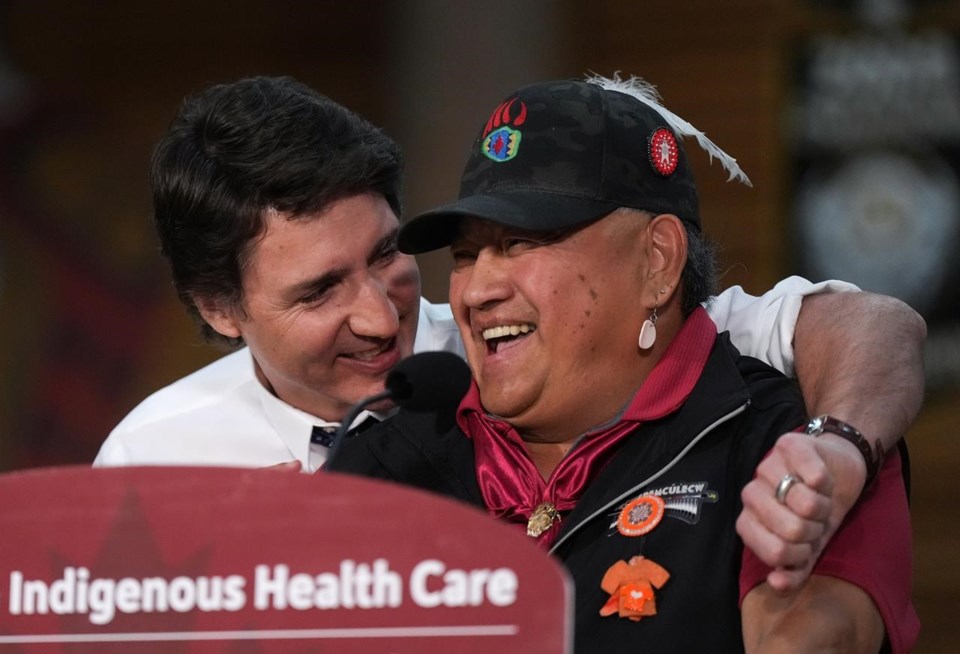VANCOUVER — Federal funding of $8.2 billion over 10 years for the First Nations Health Authority in British Columbia will give Indigenous communities unprecedented control over how to use the cash to improve wellness, including the possibility of building housing, said one of the negotiators of the agreement.
Wayne Christian, the deputy chair of the First Nations Health Council, said the funding announced Friday is a game-changer because it opens up the possibility of individual communities deciding to use funds towards "social determinants of health," which may include affordable housing.
"The communities will need to sit down and decide what do they really want to do in relation to social determinants," said Christian, a 40-year veteran in Indigenous community advocacy.
He was one of the First Nations leaders who negotiated the new funding agreement over two years with the federal government.
"One of the issues that keeps coming up as an example is housing … that's one of the areas that people may want to take that and say, 'Look, we need adequate housing, we need emergency housing.'"
In addition to the $8.2 billion towards the design, management and delivery of care to First Nations communities, the new deal also includes $5 million annually for investments in social determinants of health, Christian said.
"Social determinants are not just medical health," he said. "It's looking at housing, as an example, or looking at things communities need in terms of their well-being."
The new funding was announced by Prime Minister Justin Trudeau during his visit to the Squamish Nation in West Vancouver Friday.
Trudeau said the authority has transformed the way health is delivered to First Nations in B.C. in giving Indigenous communities a way to map their own health-care decisions and practices.
The new funding, Trudeau said, is about ensuring First Nations have the best possible health outcomes, and this type of collaboration is needed across the country.
"This renewal is about improving delivery and meeting the unique health needs of First Nations communities with things like more community-based approaches to health care, recognition of the intergenerational trauma that impacts well-being in your communities," Trudeau told the crowd.
The authority took over health care for B.C. First Nations in 2013 from the federal government for the planning, management and delivery of health programs.
Indigenous Services Minister Patty Hajdu, who also attended the funding announcement, said that work on creating similar models of First Nations health care is underway in provinces like Nova Scotia, Manitoba and Quebec.
Hajdu said that the model in B.C. is a possible road map for other Indigenous communities to follow, but it takes more action from First Nations leaders and the respective provincial governments to move things forward.
"I think one big difference is a willing partner in the province of B.C.," Hajdu said. "From the very beginning, British Columbia has leaned into this idea that they could work collaboratively with the First Nations Health Authority in this province, and they would be able to support both financially (and) from a practical sense the integration of health services."
The federal government said in a statement that fixing the disparities in First Nations health care can only be achieved by addressing the cultural, social, economic and historical disadvantages that have led to intergenerational trauma.
Christian said Indigenous people have been struggling with the colonial impacts of genocide and systemic racism and making changes to the system will take time.
"It doesn't happen in one term. It doesn't happen in one decade, but it has to start somewhere," he said.
The First Nations Health Authority is the first of its kind in Canada.
After the announcement, Trudeau took questions from the audience but the media was not allowed to ask questions.
At about the same time in Ottawa, his chief of staff, Katie Telford, was testifying before a House committee looking into possible foreign interference during the last two elections.
This report by The Canadian Press was first published April 14, 2023.
Chuck Chiang, The Canadian Press



